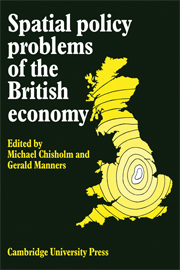Book contents
- Frontmatter
- Contents
- List of tables
- List of figures
- Preface
- 1 Geographical space: a new dimension of public concern and policy
- 2 Employment mobility in Britain
- 3 Leads and lags in inter-regional systems: a study of the cyclic fluctuations in the South West economy
- 4 Spatial structure of metropolitan England and Wales
- 5 Poverty and the urban system
- 6 Some economic and spatial characteristics of the British energy market
- 7 Growth, technical change and planning problems in heavy industry with special reference to the chemical industry
- 8 Freight transport costs, industrial location and regional development
- Index
8 - Freight transport costs, industrial location and regional development
Published online by Cambridge University Press: 21 May 2010
- Frontmatter
- Contents
- List of tables
- List of figures
- Preface
- 1 Geographical space: a new dimension of public concern and policy
- 2 Employment mobility in Britain
- 3 Leads and lags in inter-regional systems: a study of the cyclic fluctuations in the South West economy
- 4 Spatial structure of metropolitan England and Wales
- 5 Poverty and the urban system
- 6 Some economic and spatial characteristics of the British energy market
- 7 Growth, technical change and planning problems in heavy industry with special reference to the chemical industry
- 8 Freight transport costs, industrial location and regional development
- Index
Summary
The national income accounts show that in 1969 the transport sector, excluding communications, contributed 6.2 per cent of the Gross Domestic Product of the United Kingdom. Back in 1956, the figure was 6.9 per cent and in the intervening years the proportion, though declining slowly, has been very stable. Edwards (1970 a), using census data for the production and distribution industries, concluded that ‘it is probable that transport accounts for at least 9 per cent of the total cost of producing and distributing [goods]’. On the face of it, spatial variations in the incidence of transport costs ought to be a highly significant factor for industrial location and for regional development generally.
Yet, in his review of the available post-war literature on industrial location in this country, Brown (1969, 778) came to the following conclusion:
The trend of thought in this field has been towards the realisation that transport costs are of relatively minor importance in the majority – and an increasing majority – of industries, that adequate supplies of trainable labour (for some purposes, and for some firms, already-trained labour) are of paramount importance in the post-war situation of relatively full employment, that managerial communications with clients, suppliers, sub-contractors, colleagues and various professional services loom large, and that amenities are important – these last two especially to the people who make the locational decisions.
Brown could have added that it is widely accepted that though transport costs may be a negligible factor in industrial location, other attributes of the transport sector are important; speed, reliability, convenience, packaging problems and the feasibility of integrating transport services into the production process are all given serious consideration by industrialists.
- Type
- Chapter
- Information
- Spatial Policy Problems of the British Economy , pp. 213 - 244Publisher: Cambridge University PressPrint publication year: 1971
- 6
- Cited by



